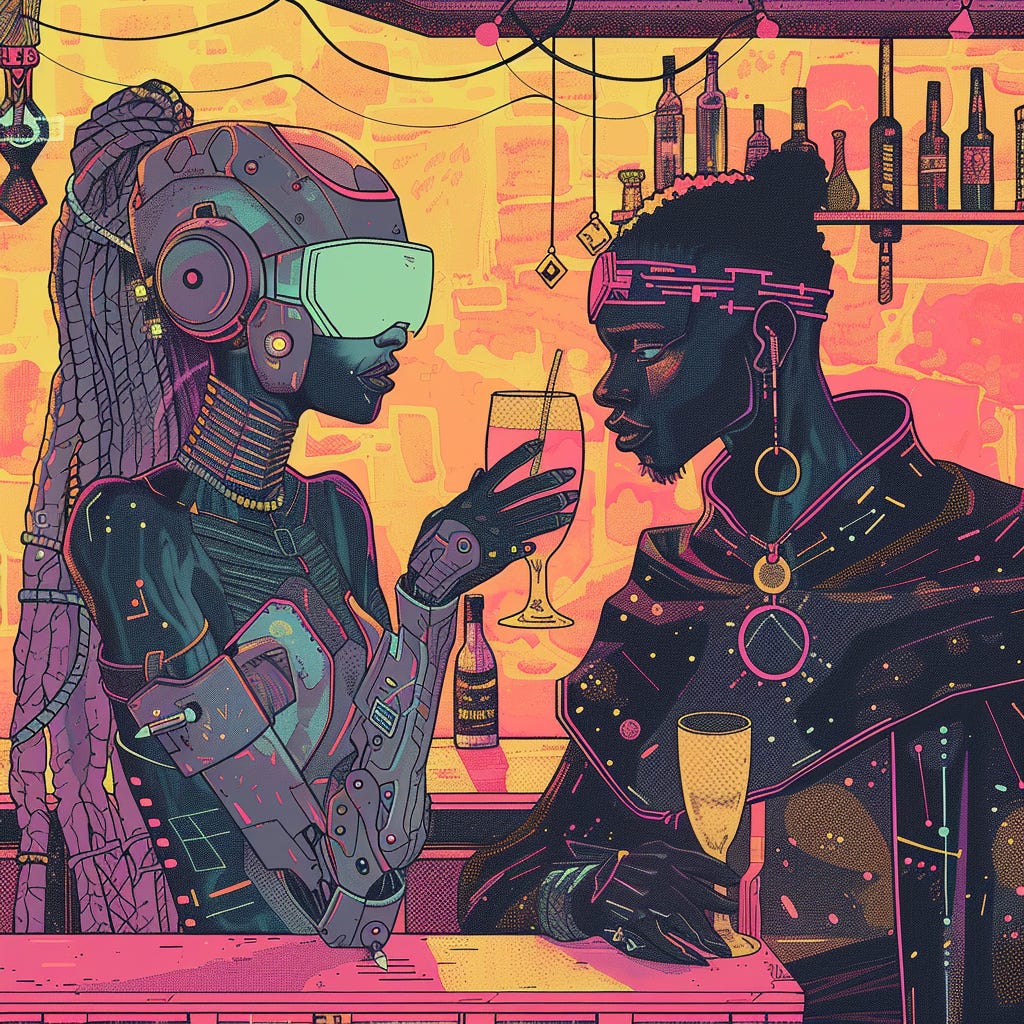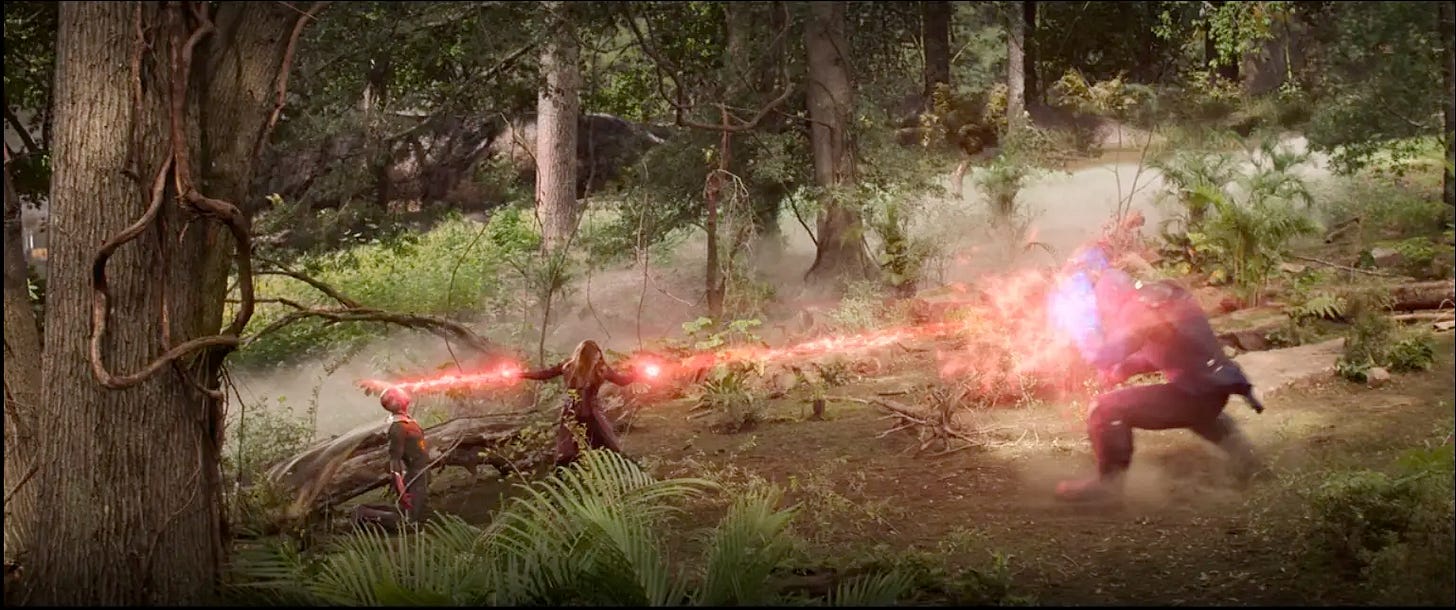A Wizard & A Cyborg Walk Into A Bar...
When technology reigns, will we lose the magic?
A Wizard & A Cyborg Walk Into A Bar
Or, more likely, the wizard teleports in, and the cyborg beams in as a photorealistic hologram, while the rest of us normies stand in a long line in the cold, waiting to be vetted by the bouncer. The two new friends share a drink and a wink. Cheers to magic! And another to technology!
Wait, what’s going on here…?
If this were a piece of genre fiction, it would be rather confusing. The mystical, cheeky world of magic does not often overlap the mechanical, binary world of technology . We have Lord of the Rings on one hand, and we have The Matrix on the other. We have Harry Potter, and then we have Blade Runner. But we also have the comic book universes which haphazardly mash together science and mysticism to give us cinematic moments like this:
Yes, that is a witch martyring her synthezoid lover, while fighting off a giant alien who’s wielding magical stones which harbor (almost) all the powers of the universe. Even though the lore takes itself seriously, when watching stuff like this you sometimes just gotta shrug your shoulders and say “power is power”. It can feel like science and mysticism are just aesthetic ornaments to the real concern - good vs. evil.
Then there are works like Dune, which cleverly toe the line. The Bene Gesserit are as witchy as it gets, but I don’t get the feeling that their powers are sourced from any spooky realm; rather, they seem mystic but can be explained by bewildering advancements in science and psychology, and intense training. The psychedelic dust, spice, and its deadly relative, the Water of Life, can be explained by the ecology of the planet Arrakis, despite giving its users visions of the future and memories of the past - totally witchy! But scientific. Yet witchy.
I’m not sure how much of the world still truly believes in mysticism - beyond the tepid acceptance of such things in religion - but I’m confident it’s way less than it used to be. The more the scientific corpus expands, the more readily we try to explain everything by it. Phenomena that we can’t explain - paranormal activity, answered prayers, dream symbology - remain the purview of spiritualists and priests, but we often deride such serious attempts to explain the inexplicable as “woo woo”. Most of us feel like we have been unchained from Plato’s cave and have stopped mistaking shadows for the real thing. So now, in all except the most religious or niche circles, mysticism seems to have lost its stupefying power and has become a plaything - an aesthetic.
We are concerned not with the possibly immaterial forces lurking just beyond our perception, but instead with what effects they can cause materially: the magic.
Thinking Magically
One definition of magic is “the power of apparently influencing the course of events by using mysterious or supernatural forces”. Seems about right - the magic of his mother’s love saved Harry Potter from being murdered as an infant. But there’s another definition of magic (the British informal adjective form), “wonderful; exciting”, which I think encapsulates what we mean in the modern sense of the word, outside of fiction. We attend magic shows to have our expectations shattered in exciting ways. Disneyland entices families to “return to the land of magic”, not because children will seriously engage with mysterious or supernatural forces, but because they will have a wonderful experience that adds a delightful flavor to reality.
I’m trying to be very careful with my word choice here. It’s hard to talk about such concepts without risking confusing the whole point. But for me, that’s the fun of this whole analysis. Regardless of whether we see magic as mere amusement, as a useful spiritual analogy, or as a genuine force in the world, our desire to categorize some phenomena as separate from reality as usual is inherently interesting. Many of us have defaulted to explaining things by science, but we still yearn to be awestruck by things we can’t explain. We don’t believe, but… we kinda want to.
Yet, more and more of human experience seems to be explicable and transformable by science. Whether it’s the miracle of life being genetically manipulated or attempts to replicate the human mind via artificial intelligence, our innovations are leaving less and less room for playful speculation about the universe - the magic of existence. It can feel exhausting, the need to distill everything into logic, physics, and chemistry. Every wonderful thing under the sun is deconstructed and analyzed until it feels bland. The nihilist triumphantly concludes, “see, it’s all just meaningless material”.
But it doesn’t have to be this way. It isn’t always this way. Many scientific thinkers retain wonder at the universe, despite having granular knowledge of how it works. The truth of humanity, so far, is that we can’t know everything. Even when we think we do, we have to keep looking, else we’re still in that cave. Riding the edge between known and unknown, believing that there’s more than we can see, keeps the magic alive.
Building Magically
Technology, which I define as “the application of knowledge to the problems of life and the resulting capabilities”, is not in opposition to magic. In fact, it’s fair to say that both a wand and LSD are magical technologies. The former solves a problem relevant to the supernatural realm; the latter effects magical experiences in people, though its chemical properties are explicable in the material world. (Maybe that’s a stretch, but I stand by it.)
Earlier, I claimed that we are more concerned with the effects of magic than the mysterious forces that make it possible. I think the same is true of technology, increasingly so in this dawn of AI. The people creating the technologies cannot explain many of the emergent effects. If the acceleration of innovation eclipses our understanding, we might completely lose our grip on ever being able to explain what we’ve done. Our relationship to the whole enterprise of technology might feel less like the cyborg’s total control and more like the wizard’s cautious manipulation.
All this to say: respect the unknown, nerds.
The wizard raised his glass to the cyborg again. “Say, where are you beaming from?”
“I’m in space, far, far away,” she answered.
The wizard chuckled. “Not enough here to entice your metal presence?”
“Nothing new in the galaxy, friend —” she sang.
The wizard joined. “All the magic’s gone, the stars be the end.”
“I’m surprised to hear you say that,” the cyborg said, tipping back a shot.
“It’s just a catchy song,” the wizard said, with a shrug. “And a useful lie.”




